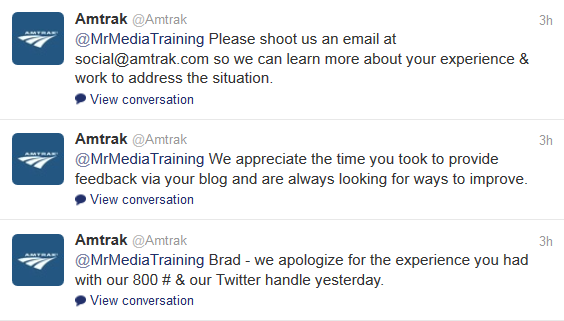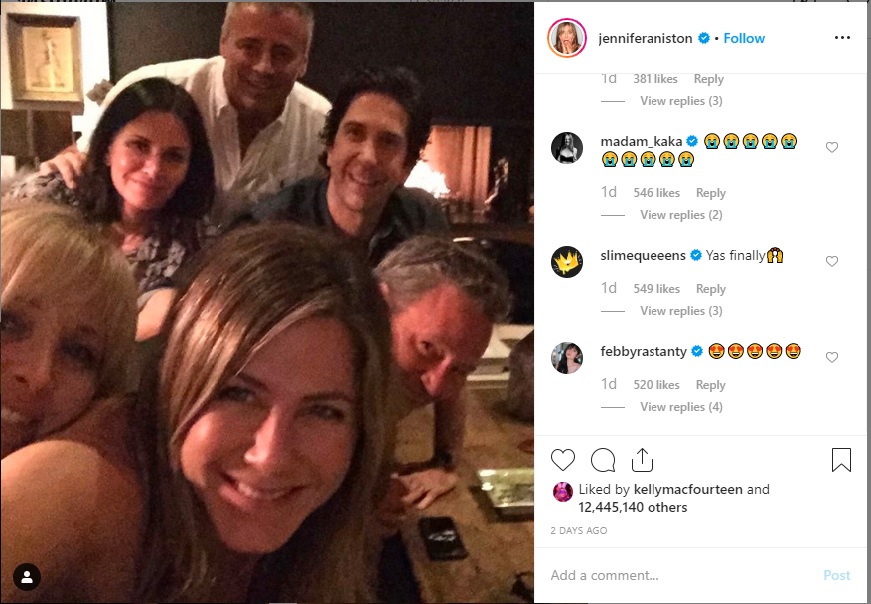On the Wrong Track: When Social Isn't Really Social
I’m an Amtrak fan.
I’ve booked more than one hundred Amtrak tickets over the past couple of decades, and generally enjoy the experience. It’s an easy way to get from my home base of New York to my company’s base in Washington, D.C., and the trains (especially the higher speed Acela) usually get me to my destination on time, and without too much wear and tear.
So when I needed to make an itinerary change this week—a rare request from an easy customer—I was disappointed that the telephone agent not only wouldn’t accommodate me without an additional $60 fee, but seemed generally uninterested in helping me at all. (I wanted to board the same train I had already booked and paid for, but from a city closer to my destination.)
Since Amtrak has a Twitter feed, I thought I’d try to reach out to the company for help that way:
To its credit, Amtrak responded quickly:
But the link they sent me to was a webpage, at which I was supposed to fill out a generic customer complaint form. Not exactly the one-on-one customer service intervention I had hoped for — nor did they DM me (a rather standard Twitter customer service approach), as I had requested. I told them that in my next tweet:
Amtrak didn’t respond.
Later that day, still frustrated by my experience (and still hoping to resolve my unsettled ticketing issue), I thought I’d try one last time:
Again, Amtrak responded – but this time, they sent me to their main toll-free telephone number:
I explained that the toll-free number was the source of the original frustration:
Again, Amtrak didn’t respond.
So all of that leads to a question: What is the best practice for corporate “social” media? Does it really add any value to the customer experience to have a somewhat responsive social media team that only responds by sending people to generic online forms and toll-free numbers?
Many companies have now integrated social media communicators into their customer service teams. Those social-savvy pros monitor their company’s feeds, responding to customers with direct assistance. Amtrak, however, seems to see social media as just another medium through which to funnel customer concerns to other channels—even if those channels were the source of the original problem.
I’ve been a loyal Amtrak customer who regularly praises the company’s work—even when some friends and colleagues don’t—and felt that I deserved, at the least, a respectful and concerned customer service experience. I gave them three tries; once by phone, twice by Twitter. Even if they didn’t ultimately satisfy my ticketing concern, they had several opportunities to make a genuine attempt to hear me out. Instead, their uncaring handling of my concern led to this bit of negative press.
When it comes to social, it seems to me that Amtrak is on the wrong track.
UPDATE: June 12, 1:30pm: Amtrak sent a few tweets to me this morning apologizing:
I appreciate the reply, and asked them to please call me to discuss (they haven’t yet). But it’s also too late to remedy this situation. As a result of Amtrak’s inflexibility, I had to reschedule a client meeting, travel to a city farther away from my destination in order to catch the train, and lose two hours of sleep (really!).
So here’s another question to consider: If a brand doesn’t respond in any real way to your first three attempts to remedy a situation — and apologizes only after you post a blog story (your fourth attempt) — will the apology be perceived as sincere? I suspect many people would question the very motive of their apology – is a sincere attempt to do the right thing (hopefully, and entirely possible), or is it an attempt to placate an unhappy customer who also happens to have a blog? What do you think?
If you enjoyed this article, would you please help me reach a larger audience by sharing it with your social networks? Share buttons are below. Thank you!










Brad,
I think it’s both–sincere attempt to make things better AND placate a blogger before the thing gets worse. I hope that Amtrak will learn that it needs to be more responsive to their social media platforms. It is a difficult area for companies since there are two skills involved–social media and customer relations. Companies are still rather slowly coming around to realizing that customers use social media to get customer service and they must adapt.
Truth is, unless you start flying the shuttle or taking the bus, Amtrak is probably still one of your best bets between NYC and DC.
Deborah
Brad: I want to comment extensively, but I need to take some time to pull my thoughts together. I’m often on the receiving end of customer complaints in social media, and I have a very different perspective that’s going to take me a little while to write and express appropriately. Fundamentally, I believe that consumers have come to expect a bit too much in terms of the way a company replies to them re: social media–or at least are often unreasonably impatient of the time that it might take for a company to reply and viewing that delay as indifference. As someone who works closely with our customer support team on questions and concerns from customers via social media, I’ve seen solid customer support work that is viewed as poor because it didn’t happen in 30 seconds, or didn’t happen exactly the way the customer expected. I think that social media has set expectations about customer support inappropriately. I’ll work on my thoughts and post a more extensive reply in the next couple of days.
Art –
I look forward to hearing your perspective – you always have smart things to add to the blog.
I’ll wait until you compose your full reply before offering a full response. The only thing I’d add is that in this case, my interaction with Amtrak seems to suggest that they won’t engage with customer complaints via social media – instead, their policy appears to be sending customers to webpages and generic toll-free numbers. I’d suggest that’s a systemic problem, and that it doesn’t seem to conform to social media best practices for companies.
Also, please notice the latest interaction. I have no idea who sent me the latest tweet (no person signed their name), and they sent me to a general email box. If social is supposed to be social, it would be nice to deal with a real person.
Thanks, as always, for writing.
Brad
Hi Brad, it’s a big challenge but clearly Amtrak is not quite ready to become a prime time “social business.” It’s a huge step, cost and commitment to handle customer relations online. They would be smart to devise a better call center strategy and capability rather than create an expectation of online support. Again communicating, directing customers to a resolution center and stating what to expect would be a smart place to start.
There will be missteps by many on the road to true social business operations. One thing is certain: it’s inevitable for every business and organization.
If you don’t mind, I’ll share a link to my story of how Cirque du Soleil handled things when it wasn’t even their fault: “Cirque du Soleil: A Merry Christmas PR Story” http://bit.ly/vc35XV
Jeff,
Thanks very much for your comment (and the link to your excellent Cirque story).
I asked Steven Frischling, the author of the travel blog “Flying With Fish,” how the North American airlines did in terms of engaging with customer complaints on social media. He said that @AmericanAir, @WestJet, @DeltaAssist & @SouthwestAir all provide solid customer service. Earlier tonight, I happened to see someone in my Twitter feed tweet their praise for Delta’s Twitter customer service.
My sense is that Amtrak is behind their peers. Perhaps that’s because they have a virtual monopoly on the rails, at least nationally. Perhaps it’s due to a lack of funding. Perhaps it’s due to a lack of executive commitment to social. Whatever the reason, many of their peers in the sky appear to be outperforming them.
Thanks, as always, for reading!
Brad
Brad:
My apologies for the delay in responding to this, per my earlier comment. I think that my difference in perspective comes from some conclusions I inferred that you drew from your interaction with Amtrak: 1) that they were not being responsive, and 2) that they didn’t get social. As someone who monitors social media for my company, I think there are often assumptions that customers make about the degree of interest a company takes in them that are nowhere near the truth of the matter, and it’s those very assumptions that hamstring their efforts to get their problems resolved.
First, there is the assumption that many make—as you did—that not responding in exactly the way you requested is an indication that the company “doesn’t care.” Companies do care about their customers; they must, or they will find themselves out of business in short order. However, companies also have processes that they take great pains to implement to ensure that every customer gets treated consistently and professionally. They establish those processes based upon the ways in which their customers prefer to interact with them. Because dollars and resources are limited, they will prioritize the media through with they receive customer feedback to ensure that the majority of customers get excellent customer support. For instance, if a company sees that the vast majority of its customers use—and prefer to use—a website form to interact with the company, than the company will prioritize resources around that avenue of entrance. They will similarly prioritize measurement of their customer support efforts around the website. That’s not to say that they are going to ignore other avenues, but their research might have led them to believe that most customers expect (and respond positively to) this kind of handling. Such might have been the case with Amtrak. And your interaction with Amtrak might have been their attempt to show that they cared by ensuring that your feedback got into their customer support process so that you would get an excellent experience. Just because you asked for a particular kind of interaction doesn’t mean that it’s the best way for the company to ensure that you are satisfied. It also doesn’t mean that they don’t care. It’s just that they have prioritized an approach for managing the vast array of customer feedback to ensure that the majority are served excellently well. I use a saying whenever I’m in a meeting for a project I’m leading: “Everybody gets their say, not everybody gets their way.” We as consumers suffer from the same feelings of entitlement that we often rail against. We expect that, as a customer, we will be treated the EXACT way we want to be treated. I’d suggest that such an expectation is unreasonable. You might have wanted a DM on Twitter as a response, but that request might have been more the exception than the rule for Amtrak. Your response that, “I’m not going to do that because it’s not what I asked for” is—and you’ll pardon my frankness—rather petulant. You might have gotten excellent customer service if you chose to accommodate Amtrak in their request. As you’ve been a loyal Amtrak customer for many years, haven’t they earned a bit of accommodation from you, as well? You went straight from being “loyal Amtrak customer” to “Amtrak FAIL” in no time flat. I’d suggest that’s unfortunate. Again, everybody gets their say, not everybody gets their way.
I’d suggest, too, that your reaction to the telephone rep was also colored by the fact that he/she said “no”. We as consumers tend not to take that well, despite the fact that, similar to what I mentioned above about your preferred method of interaction, your request might have been more the exception than the rule. What might seem like a simple request from you might require major adjustments in the company’s infrastructure and processes that would impact its ability to serve the majority of its customers, leading it to make a conscious choice not to accommodate such requests. The fact that the customer support rep said no to your request likely made you perceive his/her attitude as being inattentive. Had he/she said yes, you wouldn’t have minded, and this post wouldn’t have happened.
Regarding your assertion that Amtrak doesn’t get social, I’d return to my discussion above about avenues for customer service. Companies aren’t required to participate in social media just because it’s there. We consumers assume that a company will be in social media up their eyeballs. But the fact is that it is simply another medium for communication. As I mentioned above, companies take pains to prioritize how they interact with their customers. Not prioritizing social media could mean nothing other than the fact that the company has made a conscious choice about how it’s going to interact with consumers based upon their research. Saying that company “doesn’t get social” is an easy way to take a swipe at them without considering that they might have done their homework and concluded that social doesn’t work for most of their customers. They could just as easily say to you, “You don’t get Amtrak.”
Which brings me to my conclusion—that we live in a world where we put value on the relationships that we have with companies, but we also place all of the responsibility for the integrity of that relationship on the companies themselves. We abdicate our role in the relationship—understanding that it’s give and take, just like in any relationship. We like to explain this away by saying that we spend money with the company, and that’s what we bring to the relationship. But if we are truly committed to having this one-on-one relationship with any company or brand, we have to treat them like we would any partner in a relationship. We have to assume that their not trying to pull one over on us. We have to understand that they’re not perfect. We have to realize that sometimes they will let us down. That sometimes they have to tell us “no.” I think it’s bad form to publicly “out” them for their shortcomings, just as I would if we were doing it to another person. We have to alter our perceptions of the relationship from “little, tiny, powerless person and big, mean, nasty company” to something approaching equals. We might not be equals in reality, but the shift in perception will I think cause us a lot less heartburn in our interactions and help us take some of the onus off the company by meeting them half way in our relationship.
Hi Art,
Thank you very much for leaving your thoughts on this! I appreciate your candor, as well as your experience from the other side of the customer service experience.
Instead of responding point-by-point, I’d just like to offer a few thoughts:
First, you write that “Companies aren’t required to participate in social media just because it’s there.” While that’s technically true (no one can “require” them to), it’s like saying that “Companies aren’t required to answer their phones just because customers are calling.” Many other comparable brands, such as Delta Airlines and Southwest, are directly engaging with customer complains through social media. I can’t imagine they’re looking at a vastly different set of research that Amtrak is, but I could be wrong.
Next, you wrote that “Companies do care about their customers; they must, or they will find themselves out of business in short order.” In this case, Amtrak is heavily subsidized by the federal government and is essentially a monopoly. Since they’re not fully operating in a true free market, I’m not sure that’s true. Yes, consumers can drive or fly instead of taking a train – but there’s no other player on the rails in most of their markets.
Regarding my own experience: As a good example, please see my final Twitter exchange with Amtrak. When they responded to me by telling me to call their toll-free number, I responded by telling them that was the source of my original complaint. They didn’t respond. Don’t you think some kind of alternative customer intervention is appropriate at that point? Otherwise, it reminds me of Joseph Heller’s famous Catch-22: Unhappy with our phone service? Try our phone service! As for their suggestion that I fill out their web form, it wouldn’t have worked given the timely nature of my situation. I needed to make a fast decision.
The bottom line for me is that yes, I was looking for an exception to the rule. An intuitive and reasonable one, but an exception nonetheless. After hundreds of trips with Amtrak, I would have at least appreciated a fair hearing. Had they said no but made it clear that they appreciated my business and were sorry they couldn’t accommodate me, I never would have written a post.
One final note, about my “petulance” in this case. I won’t defend myself against that charge; perhaps it’s true. But I’d also say that I’ve had plenty of experiences with brands in the past who turned around a negative experience and earned years of my customer loyalty as a result of treating me like a real person, not just another caller in the queue. Amtrak had that chance here (several, actually), and opted not to take it.
Art, I really appreciate your smart and VERY well-argued comment. Thank you for taking the time to leave the comment and challenge my thinking.
Best wishes,
Brad